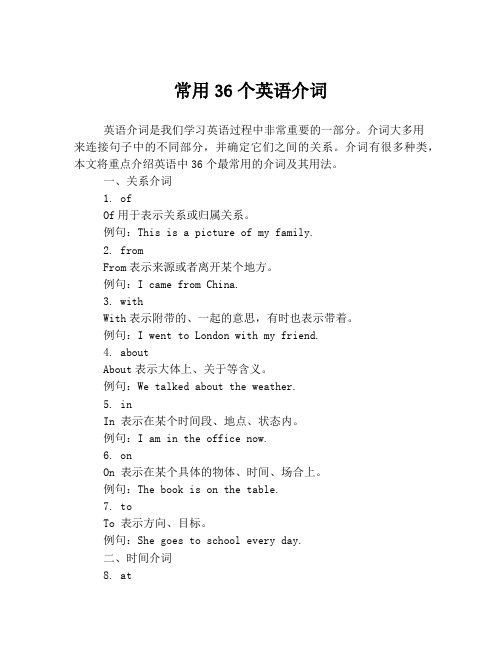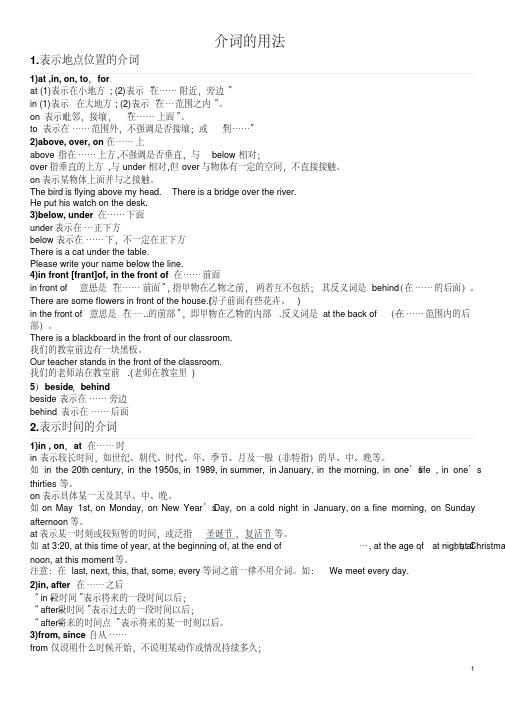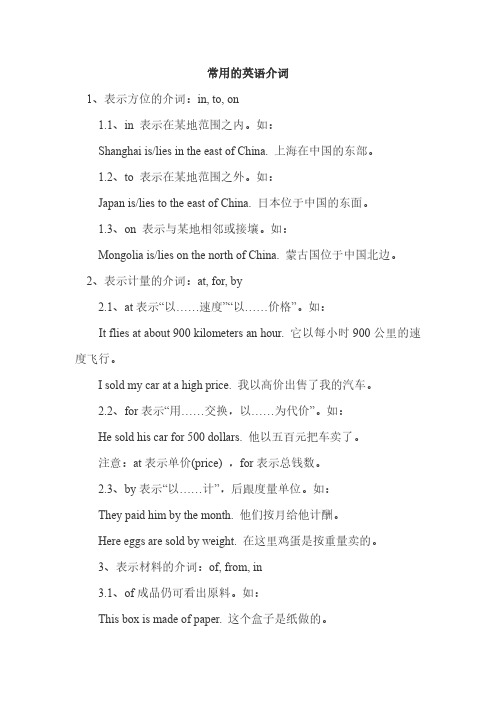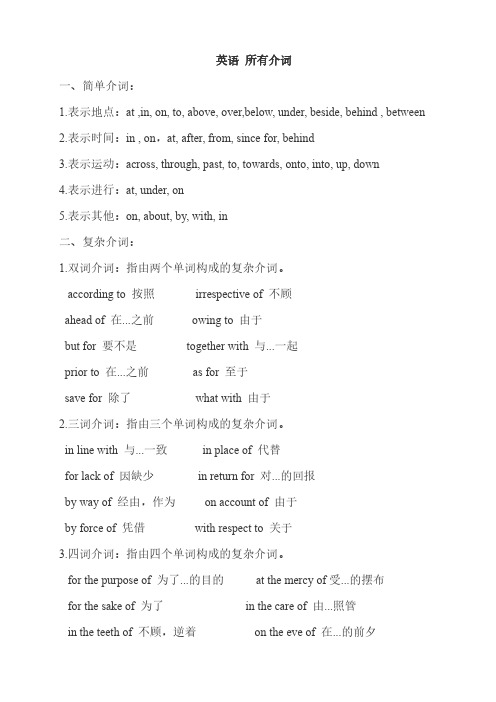英语中的介词(基础篇)
- 格式:doc
- 大小:39.00 KB
- 文档页数:4

英语介词分类(一)英语介词分类英语介词是一类重要的词性,用于表示名词或代词与其他句子成分之间的关系。
介词可以分为多个不同的类别,根据其用法和功能进行分类。
下面将列举一些常见的英语介词分类,并对每个分类进行说明。
基础介词基础介词是最基本、最常见的介词分类。
它们主要用于表示时间、地点、方向和方式等关系。
一些常见的基础介词有:•at - 表示具体时间、地点等,例如:at 9 o’clock, at the park。
•in - 表示较大的时间范围和地点范围等,例如:in the morning, in London。
•on - 表示具体的日期和天数,例如:on Monday, on the 5th of June。
•to - 表示方向和目的地,例如:go to school, travel to Paris。
方位介词方位介词主要用于表示物体或人物的位置和方向关系。
它们可以指示相对的位置,也可以指示方向。
一些常见的方位介词有:•above - 表示在某物或某人的上方,例如:above the table, above my head。
•below - 表示在某物或某人的下方,例如:below the line, below the surface。
•behind - 表示在某物或某人的后方,例如:behind the door, behind the car。
•in front of - 表示在某物或某人的前方,例如:in front of the building, in front of the mirror。
时间介词时间介词主要用于表示事件发生的时间关系。
它们可以指示具体的时间点、时间段或时间顺序等。
一些常见的时间介词有:•before - 表示在某事件之前,例如:before the meeting, before breakfast。
•after - 表示在某事件之后,例如:after the game, after lunch。

英语知识点之介词
介词是一种词类,一般用来表示一个词与其他词或短语之间的关系。
以下是一些常见的英语介词及其用法:
1. in:表示在一些位置或状态,“在处”、“在时”等
例句:in the park(在公园里)、in the morning(在早晨)
2. on:表示在一些表面或位置,“在天”、“在时刻”等
例句:on the table(在桌子上)、on Monday(在星期一)
3. at:表示在一些位置或事件发生的地点,“在特定点钟”、“在一些地方”等
例句:at the store(在商店里)、at 9 o'clock(在9点钟)
4. to:表示方向或目的地,“去地”、“给人”等
例句:go to school(去学校)、give it to me(给我)
6. with:表示陪同或使用,“和人在一起”、“用物”等
例句:go shopping with my sister(和我姐姐一起去购物)、write with a pen(用钢笔写)
7. by:表示经由其中一种方式或交通工具,“乘坐交通工具”、“用其中一种方式”等
以上仅是介词的一小部分,介词的使用是非常灵活和多样的,需要根据具体语境和短语搭配来确定使用。

英语介词总结:英语中的介词有:in、on、about、with、at、beside、by、near、behind、across。
in意思:prep.在…里;在…中;在…期间;在…以后;adv.进;入;在里头;到达;上涨;adj.在家的;在办公室的;流行的;symbol(In)铟;abbr.(IN)印第安纳州。
例句Pilot whales can go to 600 metres in a dive lasting 18 minutes.领航鲸一次下潜可达600米,持续18分钟。
He had to keep his large family in the manner he had chosen.他不得不以他所选择的方式养活他的一大家子人。
on意思:prep.在…上;位于;关于;涉及;作为成员;以…为目标;adv.在上面;继续着;上演;进行中;开着的;n.【板球】腿侧区;(ON)安大略;古挪威语。
例句I did not get where I am today by sitting on my duff.我可不是靠整天坐着不动取得今天这样的成就。
That reminds me to bring you up to speed on the soap opera.那提醒我要让你跟上那剧情。
about意思:prep.关于;有关;在…各处;围绕着;在…中各处;对于;为了;adv.各处;到处;在里面各处;四下;大概;大约。
例句You can live how you like, but there's the children to think about.你可以爱怎么过日子就怎么过,但要考虑孩子。
He had heard gossip that I was gadding about with an airline stewardess.他曾听到关于我的闲话,说我和一位空姐四处寻欢作乐。
with意思:prep.和…在一起;跟;同;和;有;带有;用;以;借助;反对;对立;由…负责;由…处理;对;对于;为…所雇用;作为…的成员;受…影响;表示与某物分离。

常用36个英语介词英语介词是我们学习英语过程中非常重要的一部分。
介词大多用来连接句子中的不同部分,并确定它们之间的关系。
介词有很多种类,本文将重点介绍英语中36个最常用的介词及其用法。
一、关系介词1. ofOf用于表示关系或归属关系。
例句:This is a picture of my family.2. fromFrom表示来源或者离开某个地方。
例句:I came from China.3. withWith表示附带的、一起的意思,有时也表示带着。
例句:I went to London with my friend.4. aboutAbout表示大体上、关于等含义。
例句:We talked about the weather.5. inIn 表示在某个时间段、地点、状态内。
例句:I am in the office now.6. onOn 表示在某个具体的物体、时间、场合上。
例句:The book is on the table.7. toTo 表示方向、目标。
例句:She goes to school every day.二、时间介词8. atAt 表示时间的具体点,通常与钟表时间连用。
例句:I will meet you at 2 o'clock.9. onOn 表示在某个具体的时间点。
例句:My birthday is on May 1st.10. inIn 表示在某个时间段内。
例句:I will return to China in six months.三、方向介词11. in front ofIn front of 表示前面。
例句:There are two chairs in front of the desk.12. behindBehind 表示后面。
例句:The cat is hiding behind the sofa.13. aboveAbove 表示在上方。
例句:The sun is above the clouds.14. belowBelow 表示在下方。

介词的用法1.表示地点位置的介词1)at ,in, on, to,forat (1)表示在小地方; (2)表示“在……附近,旁边”in (1)表示在大地方; (2)表示“在…范围之内”。
on 表示毗邻,接壤,“在……上面”。
to 表示在……范围外,不强调是否接壤;或“到……”2)above, over, on 在……上above 指在……上方,不强调是否垂直,与below相对;over指垂直的上方,与under相对,但over与物体有一定的空间,不直接接触。
on表示某物体上面并与之接触。
The bird is flying above my head. There is a bridge over the river.He put his watch on the desk.3)below, under 在……下面under表示在…正下方below表示在……下,不一定在正下方There is a cat under the table.Please write your name below the line.4)in front [frant]of, in the front of在……前面意思是“在……前面”,指甲物在乙物之前,两者互不包括;其反义词是behind(在……的后面)。
in front of…There are some flowers in front of the house.(房子前面有些花卉。
)in the front of 意思是“在…..的前部”,即甲物在乙物的内部.反义词是at the back of…(在……范围内的后部)。
There is a blackboard in the front of our classroom.我们的教室前边有一块黑板。
Our teacher stands in the front of the classroom.我们的老师站在教室前.(老师在教室里)5)beside,behindbeside 表示在……旁边behind 表示在……后面2.表示时间的介词1)in , on,at 在……时in表示较长时间,如世纪、朝代、时代、年、季节、月及一般(非特指)的早、中、晚等。

英语的基础介词
英语的基础介词包括:in, on, at, to, from, by, with, for, of, about 和 around 等。
1. In:表示在...里面,例如:in the box(在盒子里)。
2. On:表示在...上面,例如:on the table(在桌子上)。
3. At:表示在...地方,例如:at the school(在学校)。
4. To:表示到...地方,例如:to the store(到商店)。
5. From:表示从...地方来,例如:from China(从中国来)。
6. By:表示通过...方式,例如:by bus(通过公交车)。
7. With:表示和...一起,例如:with my friends(和我的朋友一起)。
8. For:表示为了...,例如:for you(为了你)。
9. Of:表示关于...,例如:a book of history(一本历史书)。
10. About:表示关于...,例如:what about you(你怎么样)?
11. Around:表示在...周围,例如:around the world(在世界各地)。
这些介词在英语中非常重要,它们可以用来表示时间、地点、方式、原因等。
掌握这些介词可以帮助你更好地理解和使用英语。

常见10个介词精讲一.概述介词又称作前置词,是一种虚词,不可在句中单独作句子成分.介词用于名词、代词前,也用于相当于名词的其他词类、短语或从句前,表示与其他成分的关系.二.介词的种类英语中介词的数量并不多,大致可分为三类.1.简单介词(只有一个单词)in,of,on,at,by,over,under,past,below2.复合介词(由两个介词合成为一个词)into,outside,within,onto,inside,without3.短语介词(由两个或两个以上的单词结合而成)because of,out of,instead of,according to,in front of,along with三.介词的宾语介词通常要带有自己的宾语,介词宾语有下面几种.1.名词、代词作介词宾语2.动名词或动名词短语作介词宾语3.不定式或不定式短语作介词宾语4.从句作介词宾语5.数词作介词宾语6.副词作介词宾语7.介词短语作介词的宾语其他如:till after supper 直至晚饭后from among the crowd从人群中from among these 从这些中from below the river从河的下游from under the books从这些书的下面四.介词短语的作用1.作定语介词短语作定语时必须放在被修饰词的后面.2.作状语3.作表语4.作宾语补足语五.表示某一时间或时间点的介词表示时间的介词有:in,after,during,for→表示一段时间(时间段)at,on→表示一点时间(时间点)by,till,until→表示期限(截止到)through→表示期间within→表示在一段时间内before→表示在某一时间之前after→表示在某一时间之后from,since→表示时间起点1.atat用于表示时间、时刻的某一点.再如:after表示以过去时间为起点的一段时间以后,因此通常与过去时连用;in表示从现在算起的一段时间以后,因此通常用于将来时或含有将来意义的句子He came back after three days. 3天后他回来了。

介词连词知识点总结归纳一、介词的基本概念介词(Prepositions)是一种词类,它通常用来连接名词、代词、动名词或从句等成分,表示时间、地点、方向、原因、目的等关系。
英语中常见的介词有:on, in, at, to, for, with, by, from, into, out of, between, among, through等。
1. 表示时间关系的介词on:表示某一天、日期、时间点等。
in:表示较长的时间段,季节、年代等。
at:表示具体的时间点、场所、节日等。
例句:I will meet you at the corner of the street at 3 o'clock.I was born in 1990.She always goes to school on foot.2. 表示地点关系的介词in:表示某个大的范围或容器内。
on:表示某个平面或表面上。
at:表示某个具体点或目标。
例句:The book is in the drawer.There is a cat on the roof.She is waiting at the bus stop.3. 表示方向关系的介词to:表示朝着某个目标或方向。
from:表示从某个地点或方向出发。
into:表示朝着某个范围或内部。
例句:He walked to the park.I come from China.She poured the water into the glass.4. 表示原因和目的的介词for:表示给予或用于某种目的。
with:表示陪伴或使用某种手段。
例句:I bought a gift for my friend.She cut the cake with a knife.5. 表示关系的介词between:表示在两者或多者之间的关系。
among:表示在多个之中的关系。
through:表示穿过或通过某个范围。

介词的基本用法介词是语法中的一种词类,用来表示名词、代词等与其他词之间的关系。
介词通常位于名词短语前面,起到连接词语的作用。
本文将详细介绍介词的基本用法。
1. 表示地点关系介词常用于表示物体或人的位置关系,可以简明地描述地点。
例如:in(在)、on(在…上面)、at(在…旁边)、under(在…下面)等。
示例:The book is on the table.(书在桌子上。
)2. 表示时间关系介词还可以用于表示时间关系,精确描述某个事件发生的时间或持续的时间。
常用的表示时间关系的介词有:at(在某个具体时刻)、on(在某天或某个具体日期)、in(在某个时间段内)等。
示例:I will meet him at 9 o'clock.(我将在9点钟见他。
)3. 表示原因关系有些介词可以表示原因、理由或出发点,常用的有:for(为了)、because of(因为)、due to(由于)等。
示例:He went to the park because of the nice weather.(他因为天气好去了公园。
)4. 表示方式和手段介词也可以表示某个行动或状态发生的方式或手段。
例如:by(凭借、通过)、with(用、带着)等。
示例:She draws a picture with a pencil.(她用铅笔画了一幅图画。
)5. 表示目的和结果有些介词可用于表示某个行动的目的或结果,如:to(表示目的)、for(表示目的)、result in(导致)等。
示例:I am going to the supermarket to buy some groceries.(我去超市买些日用品。
)6. 表示比较和对比介词还可以用于表示比较和对比关系。
例如:than(比)、as(和…一样)、like(像)等。
示例:She is taller than her sister.(她比她妹妹高。
)总结:介词在语法中起到连接词语的作用,表示名词、代词等与其他词之间的关系。

常用的英语介词1、表示方位的介词:in,to,on1.1、in表示在某地范围之内。
如:Shanghai is/lies in the east of China.上海在中国的东部。
1.2、to表示在某地范围之外。
如:Japan is/lies to the east of China.日本位于中国的东面。
1.3、on表示与某地相邻或接壤。
如:Mongolia is/lies on the north of China.蒙古国位于中国北边。
2、表示计量的介词:at,for,by2.1、at表示“以……速度”“以……价格”。
如:It flies at about900kilometers an hour.它以每小时900公里的速度飞行。
I sold my car at a high price.我以高价出售了我的汽车。
2.2、for表示“用……交换,以……为代价”。
如:He sold his car for500dollars.他以五百元把车卖了。
注意:at表示单价(price),for表示总钱数。
2.3、by表示“以……计”,后跟度量单位。
如:They paid him by the month.他们按月给他计酬。
Here eggs are sold by weight.在这里鸡蛋是按重量卖的。
3、表示材料的介词:of,from,in3.1、of成品仍可看出原料。
如:This box is made of paper.这个盒子是纸做的。
3.2、from成品已看不出原料。
如:Wine is made from grapes.葡萄酒是葡萄酿成的。
3.3、in表示用某种材料或语言。
如:Please fill in the form in pencil first.请先用铅笔填写这个表格。
They talk in English.他们用英语交谈。
注意:in指用材料,不用冠词;而with指用工具,要用冠词。

介词的定义和特征介词是一种用来表示词与词, 词与句之间的关系的词。
在句中不能单独作句字成分。
介词后面一般有名词代词或相当于名词的其他词类,短语或从句作它的宾语。
介词和它的宾语构成介词词组,在句中作主语, 状语,表语,补语或介词宾语。
例如:most of the students went to the classroom.大部分学生去了教室。
we play basketball on the sports ground.我们在操场上打蓝球。
介词常与动词,形容词,名词一起构成固定搭配。
belong to 属于 rely on 依靠talk to 同...谈话 be afraid of 害怕be strict with对...严格介词一般放在名词之前。
但它后面的介词宾语是疑问代词,疑问副词或者关系代词时,这些词提到了前面而只剩下介词在后了。
where do you come from?你是哪儿人?who are you talking to?你在跟谁谈话呢?what do you study for?你为了什么而学习?介词在英语词汇中所占比例很小,但它们的用法却非常灵活,复杂。
下列为常用介词及含义:about 关于,附近,大约,周围,随身.i have bought a book about shakespearean.我买了一本有关莎士比亚的书。
there are about fifteen trees in the picture.图片里大约有十五棵树。
above 在....上,高出,以上,超过,在...上游.the plane is flying above the clouds.飞机在云上飞行。
i think the man is above sixty years old.我想那人有六十多岁了。
across 横过,对面,交叉,在...的对面. can you swim across the river?你能游过河吗?we live across the street.我们住在街的对面。

英语所有介词一、简单介词:1.表示地点:at,in,on,to,above,over,below,under,beside,behind,between2.表示时间:in,on,at,after,from,since for,behind3.表示运动:across,through,past,to,towards,onto,into,up,down4.表示进行:at,under,on5.表示其他:on,about,by,with,in二、复杂介词:1.双词介词:指由两个单词构成的复杂介词。
according to按照irrespective of不顾ahead of在...之前owing to由于but for要不是together with与...一起prior to在...之前as for至于save for除了what with由于2.三词介词:指由三个单词构成的复杂介词。
in line with与...一致in place of代替for lack of因缺少in return for对...的回报by way of经由,作为on account of由于by force of凭借with respect to关于3.四词介词:指由四个单词构成的复杂介词。
for the purpose of为了...的目的at the mercy of受...的摆布for the sake of为了in the care of由...照管in the teeth of不顾,逆着on the eve of在...的前夕on the ground of根据on the part of在...方面to the exclusion of把...排除在外with an eye to为了under the auspices of在...的支持下under the guise of在...的幌子下。

介词的基本用法介词是英语中一类常见的词汇,用于表示各种关系和位置。
在句子中,介词通常用来连接名词或代词,与其他词语形成短语,进一步表达句子的意思。
在本文中,我们将介绍介词的基本用法,并提供一些例子来加深理解。
1. 表示位置关系介词在英语中常被用来描述位置关系,包括在、上、下、旁边等。
以下是一些常见的表示位置关系的介词及其用法:- 在(on):表示某物在另一物体的表面或面上。
例如:The book is on the table.- 下(under):表示某物在另一物体下面。
例如:The cat is under the bed.- 在(in):表示某物在另一物体内部。
例如:The pencil is in the drawer.- 旁边(beside):表示某物在另一物体的旁边。
例如:The park is beside the supermarket.2. 表示时间关系介词也可用来表示时间关系,包括在、在...前、在...后等。
以下是一些常见的表示时间关系的介词及其用法:- 在(at):表示某一时间点。
例如:I'll meet you at 9 o'clock.- 在...前(before):表示在某一具体时间之前。
例如:Please finish your homework before dinner.- 在...后(after):表示在某一具体时间之后。
例如:I'll call you after I finish work.- 从...到...(from...to):表示一个时间范围。
例如:The shop isopen from Monday to Saturday.3. 表示方式、原因和目的介词还用于表示方式、原因和目的等。
以下是一些常见的表示方式、原因和目的的介词及其用法:- 通过(by):表示某种方式或方法。
例如:I go to work by bus.- 对于(for):表示某事情的目的或原因。

英语十大介词介绍介词是英语中常用的词类之一,用来表示名词与其他词或词组之间的关系。
在英语中,有很多常用的介词,下面是对英语十大常用介词的简要介绍:1. in:表示在某个地方或某个时间内,例如 "in the park"(在公园里),"in the morning"(在早晨)。
in:表示在某个地方或某个时间内,例如 "in the park"(在公园里),"in the morning"(在早晨)。
2. on:表示在某个表面上或某个具体的日子,例如 "on the table"(在桌子上),"on Monday"(在星期一)。
on:表示在某个表面上或某个具体的日子,例如 "on the table"(在桌子上),"on Monday"(在星期一)。
3. at:表示在某个地点或某个时间点,例如 "at the bookstore"(在书店里),"at 6 o'clock"(在六点钟)。
at:表示在某个地点或某个时间点,例如 "at the bookstore"(在书店里),"at 6 o'clock"(在六点钟)。
4. by:表示通过某种方式或由某人完成,例如 "by train"(乘坐火车),"written by John"(由约翰写的)。
by:表示通过某种方式或由某人完成,例如 "by train"(乘坐火车),"written by John"(由约翰写的)。
5. for:表示为某个目的或时间段,例如 "for studying"(为了研究),"for two hours"(两个小时)。

一.时间介词的用法辨析时间介词in、on、at、by的用法辨析介词in用来表示一天中某段时间,指天、年、月、季节、周次等。
如:in the morning 介词on用来表示某一天或星期几,指明具体的时间。
如:on a rainy day介词at用来表示特定的时间、节日、年龄等。
如:at noon介词by表示…的时候、到、等到…已经等用在天、时间的前面。
如:by 2 o‘clock 时间介词in与after 的用法辨析介词in + 一段时间用于一般将来时。
如:We’ll go to school in two weeks.介词after + 一段时间用于一般过去时。
如:My mother came home after half an hour. 介词after + 时间点常用于一般将来时。
如:We’ll go out for a walk after supper. 时间介词for与since的用法辨析介词for 表示一段时间如:I have been living here for 10 years.介词since 表示从过去某一时间以来如:I have been living here since 2000.时间介词during与for的用法辨析当所指的时间起止分明时用介词during如:He swims every day during the summer. 如果一段时间不明确则用介词for如:I haven’t seen her for years.时间介词before与by的用法辨析介词before表示“在…之前”如:He won’t come back before five .介词by表示“到…时为止,不迟于…”如:The work must be finished by Friday. 时间介词till与until用法的异同till和until用在肯定句中,均可表示“直到…为止”,如:I will wait till(until)seven o'clock.till和until用在否定句中,均可表示“在…以前”或“直到…才”。

初中英语介词大全(带音标)1. 关于介词介词是英语中常用的一类词汇,它通常用来连接名词、代词或者名词性短语与其他部分,以表达它们之间的关系。
在初中英语研究中,了解和正确使用介词非常重要。
下面是一份初中英语常见介词大全,附带音标,希望对你的研究有所帮助。
2. 常见的介词- at [æt]:在(时间、地点)- in [ɪn]:在(地点、范围)、在(时间后面)- on [ɒn]:在(地点表面)、在(某一天)- by [baɪ]:靠近、通过、乘坐- with [wɪθ]:和、带有- to [tu:]:到、向、对于- from [frɒm]:从、自、离开- into [ˈɪntu:]:进入、转变为- onto [ˈɒntu:]:到...上、到...之上- out of [aʊt ʌv]:从...出来- for [fɔːr]:为、对于- about [əˈbaʊt]:关于、大约- with [wɪð]:用、带、跟- without [wɪˈðaʊt]:没有、无- of [ʌv]:的、属于- by [baɪ]:通过、靠- between [bɪˈtwiːn]:在...之间- among [əˈmʌŋ]:在...之中- near [nɪər]:靠近- beside [bɪˈsaɪd]:在旁边- under [ˈʌndər]:在...下面- over [ˈəʊvər]:在...上方- above [əˈbʌv]:在...之上- below [bɪˈləʊ]:在...之下- through [θruː]:穿过、通过3. 注意事项- 介词与其后的名词、代词有固定搭配,需要进行记忆。
- 不同介词有不同的使用场景和意义,需要根据具体语境进行选择。
以上是初中英语介词大全,带有音标,并附有简要说明。
在研究中,要多加练和熟练掌握这些介词的正确用法,以提升语言运用能力。
希望这份文档对你的研究有所帮助!参考资料:。

介词英语单词大全100个一、简单介词。
1. about [əˈbaʊt] prep. 关于;大约。
2. above [əˈbʌv] prep. 在……上面;超过。
3. across [əˈkrɒs] prep. 穿过;横穿。
4. after [ˈɑːftə(r)] prep. 在……之后。
5. against [əˈɡenst] prep. 反对;靠着。
6. along [əˈlɒŋ] prep. 沿着。
7. among [əˈmʌŋ] prep. 在……中间(三者或三者以上)8. around [əˈraʊnd] prep. 在……周围;大约。
9. as [əz] prep. 作为;当作。
10. at [æt] prep. 在(表示存在或出现的地点、场所、位置、空间等);以(某种价格、速度等)11. before [bɪˈfɔː(r)] prep. 在……之前。
12. behind [bɪˈhaɪnd] prep. 在……后面。
13. below [bɪˈləʊ] prep. 在……下面;低于。
14. beneath [bɪˈniːθ] prep. 在……之下(正下方)15. beside [bɪˈsaɪd] prep. 在……旁边。
16. between [bɪˈtwiːn] prep. 在……之间(两者之间)17. beyond [bɪˈjɒnd] prep. 超过;越过;那一边。
18. but [bət] prep. 除……以外。
19. by [baɪ] prep. 被;由;通过;在……旁边;在……之前。
二、复合介词。
20. according to [əˈkɔːdɪŋ tuː] prep. 根据;按照。
21. ahead of [əˈhed ɒv] prep. 在……之前;胜过。
22. apart from [əˈpɑːt frəm] prep. 除……之外;且不说。
23. as for [æz fɔː(r)] prep. 至于;关于。

30个基本介词英语1. about2. above3. across4. after5. against6. along7. among8. around9. at10. before11. behind12. below13. beneath14. beside15. between16. beyond17. by18. down19. during20. except21. for22. from23. in24. inside25. into26. like27. near28. of29. off30. on1. About: expressing a particular topic or subject, or indicating approximately.Example: She was talking about her experience in the mountains.2. Above: indicating that something is higher than another thing.Example: The sun is above the clouds.3. Across: extending or going from one side to another.Example: The bridge goes across the river.4. After: following in time or sequence.Example: She left the house after finishing her homework.5. Against: in physical contact with or in opposition to something.Example: The dog was leaning against the fence.6. Along: moving in the same direction.Example: We walked along the beach.7. Among: surrounded by or involved with other things or people. Example: She was among the crowd at the concert.8. Around: indicating movement or position in a circle or circumference. Example: The children ran around the playground.9. At: indicating a specific place or position.Example: He was waiting at the bus stop.10. Before: earlier in time or position.Example: We arrived before the movie started.11. Behind: at the back of or in a position further back.Example: He was walking behind me.12. Below: at a lower level or position.Example: The fish were swimming below the surface of the water.13. Beneath: under or below something.Example: The snake was hiding beneath the rock.14. Beside: next to or adjacent to.Example: The tree was beside the road.15. Between: in the space separating two things, people, or objects. Example: The book was between the two notebooks.16. Beyond: at or to the further side or extent of something.Example: The mountains were beyond the horizon.17. By: indicating the agent performing an action, or indicating the means or method.Example: The painting was done by Picasso.18. Down: in a lower position or level.Example: The cat jumped down from the table.19. During: over the course or time period of something.Example: The children played during the day.20. Except: not including or excluding someone or something.Example: Everyone was excited except for the boy.21. For: indicating purpose, benefit, or reason.Example: She bought the dress for the wedding.22. From: indicating the origin or source of something.Example: The letter is from my mom.23. In: expressing location within a space or container.Example: The cat was in the box.24. Inside: within the interior of something.Example: The keys were inside the house.25. Into: expressing movement or action towards the inside of something. Example: She went into the store.26. Like: expressing similarity or resemblance to something. Example: The clouds looked like cotton candy.27. Near: in close proximity to something or someone.Example: The park is near the school.28. Of: expressing possession or association.Example: The book belongs to the library.29. Off: indicating detachment or separation from something. Example: She took off her coat and hung it up.30. On: indicating attachment or contact with something.Example: The cat was sitting on the couch.。
介词的定义和特征介词是一种用来表示词与词, 词与句之间的关系的词。
在句中不能单独作句字成分。
介词后面一般有名词代词或相当于名词的其他词类,短语或从句作它的宾语。
介词和它的宾语构成介词词组,在句中作主语, 状语,表语,补语或介词宾语。
例如:Most of the students went to the classroom. 大部分学生去了教室。
We play basketball on the sports ground. 我们在操场上打蓝球。
介词常与动词,形容词,名词一起构成固定搭配。
belong to 属于rely on 依靠talk to 同...谈话be afraid of 害怕be strict with对...严介词一般放在名词之前。
但它后面的介词宾语是疑问代词,疑问副词或者关系代词时,这些词提到了前面而只剩下介词在后了。
Where do you come from? 你是哪儿人?Who are you talking to? 你在跟谁谈话呢?What do you study for? 你为了什么而学习?介词在英语词汇中所占比例很小,但它们的用法却非常灵活,复杂。
下列为常用介词及含义about 关于,附近,大约,周围,随身.I have bought a book about Shakespearean. 我买了一本有关莎士比亚的书。
There are about fifteen trees in the picture. 图片里大约有十五棵树。
above 在....上,高出,以上,超过,在...上游.The plane is flying above the clouds. 飞机在云上飞行。
I think the man is above sixty years old. 我想那人有六十多岁了。
across 横过,对面,交叉,在...的对面.Can you swim across the river?你能游过河吗?We live across the street. 我们住在街的对面。
after 在...后面,依照.He went home after school. 他放学后就回家了。
Read after me, please. 请跟我朗读。
against 撞到,靠着,反对,违背,The car hit against the tree. 汽车撞了树。
He is standing against the wall.along 沿着,顺着.They are walking along the river. 他们沿着河行走。
among 在...当中.He is the tallest among them. 他是他们当中个子最高的。
around 在...的周围,在...那一边.They sat around the table talking the news. 他们绕桌而坐谈论新闻。
There is a drugstore around the corner.拐角处有一家药店。
as 作为.He doesn't like people treat him as a child. 他不喜欢人们把他当小孩子对待。
at 在...时刻,在...点钟,在...岁时, 向,在...之中,按...速度,值(卖)...钱,He always gets up at six in the morning. 他时常早上六点钟起床。
He shot at the bird but missed it. 他向鸟射击,但是没射中。
The car goes at eighty miles an hour. 汽车以每小时八十公里的速度行驶。
before 在...的前面(位置),在...之前(时间)He took a picture before the car. 他在汽车前照了张照片。
He can't finish his work before supper.晚饭前他完不成工作。
behind 在...的后面(位置), 落后于,不如,迟于,晚于(时间)Are there any brooms behind the door. 门后有扫帚吗?All of us are behind him in mathematics. 我们数学都不如他。
below 在...之下,低于,There are four lights below the ceiling. 天花板下面有四盏灯。
The murderer run away below the police's eyes. 杀人犯从警察眼皮底下跑了。
beside 在...的旁边,在...之外,与...相比.He found the body by the river. 他在河边发现了尸体。
Beside yours,my computer is too slow. 与你的计算机速度相比,我的就慢多了。
besides 除...之外,We are all here besides Bowe. 除鲍外,我们也都来了。
between 在...两者之间,The relations between the two countries has improved since then.两国的关系从那以后得到了改善。
beyond 在...那边,The shop you are looking for is beyond the street, you can't miss it.你要找的商店在街的那边,你不会找不到的。
but 除去.He has nothing but money. 他除钱以外什么都没有。
by 被..., 在...的近旁, 在...之前, 不迟于, 以...为手段。
The classroom was cleaned by the students. 教室由学生们打扫干净了。
Miss Lucy came to China by air. 露西小姐是乘飞机来中国的。
down 沿着...望下。
She walked down the street. 她沿着街道走。
during 在...期间,在...时候。
During the holiday, we went to the south. 我们假期去了南方。
except 除...之外。
He knows nothing except English. 他除英语以外什么都不知道。
for 为..., 因为..., 至于... 。
He works for this company. 他为这家公司工作。
She came back to the classroom for she had left her books in the classroom.她返回到教室是因为把书留在了那里。
from 从..., 来自..., 因为...。
Where are you from? 你是哪里人?He died from an accident. 他死于一场事故。
in 在..., 在...之内,从事于..., 按照..., 穿着...。
He was born in 1992. 他生于1992年。
I could finish the program in two weeks. 我可以用两周时间完成这个项目。
He spend less time in reading. 他读书时间很少。
The man in black jacket is our teacher. 穿黑夹克的那个人是我们的老师。
like 象...,如同...The twins are like their father. 双胞胎象他们的父亲。
near 靠近....。
There are some flowers near the house. 房子附近有一些花。
of ...的,属于...。
This is a map of China. 这是一张中国地图。
off 离开...,在...之外。
The young man got off the train quickly. 那个年青人很快下了火车。
I live in a village a little way off the main road. 我住在离大路不远的一个村庄里。
on 在...之上。
My book is on the table. 我的书在桌子上。
out of 从...出来,在...之外。
The dog run out of the house. 狗从房子里跑出来。
outside ... 外边.They are waiting outside the gate. 他们在门外等着。
over 在...之上,遍于...之上,越过...。
There is a light over the desk. 桌子上方有盏灯。
He is over sixty years old. 他有六十多岁。
past 越过...,过...,超越.The students walked past the post office. 学生们走过了邮局。
It is ten past two. 现在是两点十分。
round 围着...,绕过...,在...周围。
We sat round the table. 我们围着桌子坐下。
The earth goes round the sun. 地球绕着太阳转。
since 自... 以后,自...以来。
He has made great progress in English since he came into the college.从他来到大学后,他的英语有了很大进步。
through 经过...,穿过...。
They went through the forest. 他们穿过了森林。
throughout 遍及...,在各处。
The police searched for the criminal throughout the mountain. 警察搜山寻找犯人。
till 直到...,在...以前。
He didn't come back till eleven o'clock. 他直到十一点钟才回来。
We'll be home till six. 六点以前我们都会在家。
to 到...,向...,趋于。
How long is it from here to the station?从这儿到车站有多远?under 在...之下,低于。
There are some footballs under the bed. 床底下有几颗足球。
These students are under seventeen years old. 这些学生们不到十七岁。